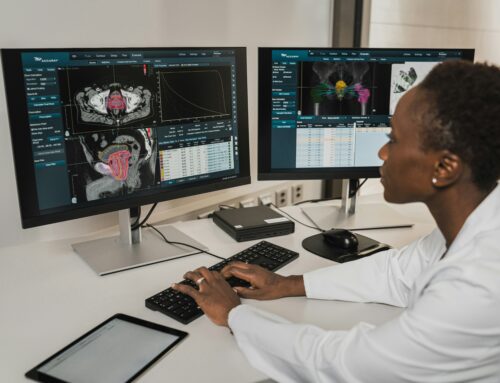FAITH is a Horizon 2020 EU-funded research project that aims to provide an Artificial Intelligence application that remotely identifies depression markers, using Federated Learning, in people that have undergone cancer treatment. Utilising a federated machine learning approach, we will build localised machine learning systems, whereby individual patient devices will run their own personalised AI models. Then, a global AI model will aggregate the individual model learnings and synchronise the local models with an updated, and improved, global model; the model will analyse depression markers (Activity, Sleep, Nutrition, and Voice). Indeed, the project identified these markers as key towards predicting negative trends in mental health to enable timely intervention. As part of the project, we will trial across sites in several European countries to assess and validate the adoption and usage of this new analytical platform.
On 18th October 2022, the FAITH project had its second interim review with the European Commission (EC) and their chosen experts. This was a virtual review, whereby the Walton team and consortium partners presented the project outputs. Chronologically, the review considered the period from May 2021 to July 2022; the previous review meeting was in July 2021, after a year and a half from the start of the project. On this occasion, 3 industry experts, selected by the EC, also reviewed and evaluated the progress of the project in meeting its objectives.
FAITH objectives and results
Work package leaders presented the ongoing research work, that addresses key project objectives, by:
- Detailing the scope of the FAITH framework and its reference architecture.
- Demonstrating our middleware & software components along with the tools & libraries that are leading us towards the Federated Learning framework.
- Demonstrating four modules (Activity, Sleep, Nutrition & Voice) and questionnaires used to capture data for analysis to gauge a user’s mental outlook.
Some of the key elements undertaken as part of this project period were:
- Creation of the back-end infrastructure.
- Development of the activity, nutrition, sleep, and voice modules to be integrated into the FAITH App.
- Verification and validation of the software outputs.
- Research and development of the core AI features required by FAITH, such as:
- Federated AI methodology and framework;
- Definition of the AI models to predict negative trends in mental health;
- Explainable and Interpretable AI.
- Refined UI requirements for patient UI to satisfy protocol specifications.
- Software architecture identified and refined for trial management.
- Designed UI for local trial teams to enable data collection and technical monitoring.
- Design & development of the FAITH Mobile Application in line with requirements.
- Define data privacy, trust and security framework for handling sensitive data.
- Integration of novel and adaptive visualisation and reporting to enhance evaluation & decision making.
- Developed data tools and models leveraging publicly available datasets to support trial data analytic.
- Selection and implementation of XAI tools and components.
- Pilot implementations for Activity Monitory module, Sleep monitoring, Appetite tracking and NLP modules.
- Ongoing dissemination and communication including monthly blogposts, newsletters, regular social media updates, collateral production (flyer, study design card, corporate presentation, use case presentations and 2 videos), two press releases, workshops and event participation.
- Industry clustering led by TFC (Cancer Survivorship -AI for well Being) with 3 Meeting of Minds events in the reporting period.
Review Outcomes
Overall, the review was a success. Following in-depth discussions, the EC and its invited experts noted that the project implementation continues to be satisfactory. In fact, the reviewers congratulated the FAITH consortium on the work achieved to date. Moreover, the productive discussions and detailed review report provided insight and guidance into the final project period. In particular, the EC has noted the good progress on scientific and technical objectives, as well as the very good level of communication and outreach activities. Therefore, in this final phase of the project, the focus must be on:
- accelerating and optimising the clinical trials;
- crafting the outputs of this final delivery phase in a way that maximises exploitability and potential for adoption. Specific recommendations related to concretising and simplifying research questions, as well as a focus on the MVP, have been taken on board.
Since the review, bearing in mind the advice, good progress has been made in all areas. Specifically, trial recruitment and execution, as well as continued refinement of technological and scientific work are taking advantage of the feedback from the review. The team is looking forward to continuing to shape and validate its AI application and framework, delivering a useful tool that can help improve outcomes for cancer patients and survivors.
Author: Gary McManus, Walton Institute.




